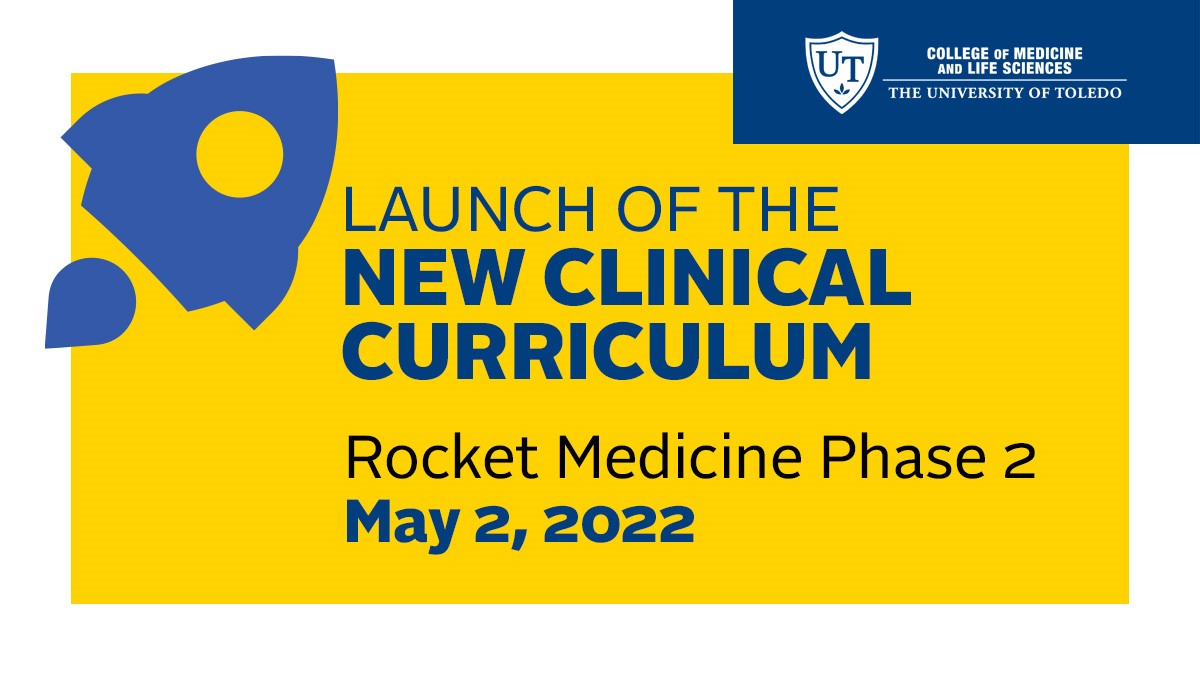Rocket Medicine: YOUR CLINICAL LEARNING JOURNEY
The Trajectory of our Clinical Curriculum: 2023-24
Our clinical education team is excited to move forward with additional innovated, learning science based changes in our clinical curriculum as we prepare our students for the current and future state of 21st century medicine. We are in the second year of our redesigned, thematically integrated clerkship curriculum and redesigned assessment of clinical performance. We strive to support the development our students as master adaptive life long learners who are stewards of health equity for all patients. The clerkship curriculum is designed to include critical competencies of health systems science and provide students with the knowledge, skills, and abilities they need to navigate the complex health care landscape that is our current system. The clerkship experience is an opportunity for our students to master the basic clinical skills and build upon their clinical reasoning skills . HIghlights of the third year:
- Integrate and Innovate – self directed learning activity for which students develop a multidisciplinary clinical question and present their conclusion to their peers.
- Critical consciousness in medicine – series of workshops during which students develop reflexive awareness of their own professional power and privilege to support individual questioning and understanding of the sociopolitical forces sthat impact our patients.
- Value based care – targeted small group experience to introduce students to basic concepts in high value care.
- Assessment of clinical performance – designed to ensure equitable assessment practices.
We have also redesigned our longitudinal Transition to Residency course to anchor our students' clinical learning during the advanced clinical experience phase. This course starts at the beginning of the 4th year by providing educational activities that will support students as they transition to more advanced learning during their acting internships and clinical electives. This course concludes at the end of the fourth year with students engaged in simulation activities (general and specialty specific) that will ensure they are "residency ready."
Additional information can be found with these links:

The next phase of The University of Toledo College of Medicine and Life Sciences' Rocket Medicine curriculum reform continues with an in-depth review and revision of the clinical curriculum.
Redesign of our clinical curriculum is a phased process. Initial reform of the clinical curriculum started in Summer 2019 with the work of the fourth-year task force, whose charge was to review and recommend changes to create a cutting edge fourth-year (Advanced Clinical Experience phase) curriculum. The task force recommendations included:
- Addition of a 2-week required Emergency Medicine rotation;
- Recognition of the need for a targeted, longitudinal Transition to Residency course (Advanced Clinical Care -1, 2, 3).
Both of these additions were made to the fourth year (advanced clinical experience phase) curriculum and started in May, 2020.
Explore our Website:
Timeline
The purpose of the Clinical Curriculum Reform Steering Committee (CCRSC) is to oversee and lead the next phase of curriculum reform at UTCOMLS – clinical education in the third and four year for our medical students.
See the full historical timeline
The Process
The reform of our clinical curriculum is being led by the Clinical Curriculum Reform Steering Committee (CCRSC). This group is co-chaired by Stephanie Mann, M.D., and Shonola Da-Silva, M.D.
Committee members:
- Nezam Altorok, M.D.
- Shaza Aouthmany, M.D.
- Jacob Bieszczad, M.D.
- George Darah, M.D.
- Lori DeShetler, Ph.D.
- Nicole Dominiak, M.D.
- Joan Duggan, M.D.
- David Giovannucci, Ph.D.
- Nicholas Henkel (M3)
- Jason Huntley, Ph.D.
- Jim Kleshinski, M.D.
- Jeremy Laukka, Ph.D.
- Coral Matus, M.D.
- Deepa Mukundan, M.D.
- Carly Polcyn (M4)
- Chris Prevette, M.S.
- Mary R. Smith, M.D.
- Sharon Thomas, M.D.
- Cathy Van Hook, M.D.
- Mehmood Rashid, M.D.
Guiding principles for curriculum reform
Based on our values of collaboration, diversity, discovery, professionalism and service, we will engage in curriculum reform with the following guiding principles:
As a college of medicine, we endeavor to graduate students who will be “excellent clinicians and scientists.” Therefore, we will graduate self-regulated, collaborative, ethical lifelong learners who value equity and integrity and will provide the highest quality, evidence-based care for their patients.
Our guiding principles:
- Student wellbeing and resilience are supported by an inclusive, equitable, and respectful learning environment.
- Students are valued as integral members of the patient care team and will be given progressive autonomy that allows them to apply their talents, experiences, and abilities to realize their full potential as self-regulated, lifelong, master adaptive learners.
- Development of professional identity will be supported through meaningful feedback, objective and accurate assessments, and preceptors (faculty and residents) who provide mentoring and role model professionalism, integrity, and ethical behavior.
- Equity and Inclusion will permeate all aspects of our educational endeavors. We will utilize various methods of instruction and discussion to address the historical, cultural, and systems contexts for inequities in medical education and health care.
- Integration facilitates meaningful learning and will be accomplished by applying cognitive science and systems thinking into a curriculum that promotes an understanding of the scientific principles of medicine, clinical skills, and competencies associated with health systems science.
FAQs
Why are we changing our clinical curriculum?
Our current structure for the clerkship phase is a siloed traditional block structure. Best
educational practices and national trends in undergraduate medical education have
demonstrated that an integrated clerkship experience is more conducive to graduating
students who will have the necessary mindset and in depth understanding of clinical
medicine to be adaptive learners in our complex health care environment. Healthcare,
science and medicine are rapidly changing; we want to make sure our curriculum evolves
and supports the growth and development of our students so they can become facile,
adept, clinically excellent physicians.
Who is planning the clinical curriculum reform?
There is a Clinical Curriculum Reform Steering Committee that has two co-chairs, 17
faculty, staff, and medical students. The first meeting of the steering committee
was July 16th. After this meeting, 5 different working groups were formed that will be lead or
co-lead by members of the steering committee. Each working group will provide an
opportunity for all interested students, faculty and staff to participate. Our goal
is to be inclusive of all perspectives during this process.
Which classes are going to be affected?
The class of 2024 (M3 class that begins on May 2, 2022, i.e., current M2 class) and
all classes going forward.
How can new content be added to an already jammed clinical year?
The redesign of our clinical curriculum will ensure that critical threads (e.g., health
equity, ethics, population health, scientific reasoning) are embedded and integrated
into each discipline. These threads will enhance learning and retention for our students.
What about grading?
One of the areas of focus will be our clinical grading paradigm.
Will students be involved in the redesign process?
Absolutely! There are two student representatives on the Steering Committee. Additionally,
there will be an opportunity for students to participate in the different workgroups
that will be designing different components of our clinical curriculum.
If I am not part of a work group, how will I know what is happening?
There will be ongoing communications from DME (via the newsletter), the Dean’s monthly
update, MSC communications, townhalls, communication from student representatives
on our Clinical Curriculum Committee, and a special webpage on the COMLS website that
will communicate updates.
When will the new clinical curriculum begin?
The newly integrated third year will begin on May 2, 2022.
How will current M3 and M4 students be affected?
There will be no direct impact on students who are currently doing clinical rotations
in either year. There will be no overlap period.



